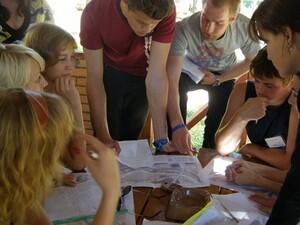The target group is 60 young people aged between 16 and 24 years. Participants will come from Scandinavia, the Baltic Sea region, Norway, Germany and Scotland. Through discussion of
a) international migration patterns,
b) demographic changes and
c) rapid urbanization
the camp aims to increase participants' openness to the demands placed on an increasingly multicultural society. Europe's cities are growing faster than ever before and new demands such as growing populations, longevity, urban agriculture and climate change require new solutions. The experiences and skills acquired should also provide a boost to their career prospects.
As a youth camp with a focus on European Cities of Tomorrow, the project ties in the themes of urban and rural development and European awareness. Participants will strengthen their sense of European citizenship and gain understanding of European spatial challenges. The programme will consider current and future challenges to urban and rural development and will enable participants to get involved in the development of their local area.
The project will reflect on the relationship between citizenship and the environment, on a local and European level. It will also discuss smart, sustainable growth and the Europe 2020 strategy. "Our objective is to develop solidarity and promote tolerance among young people. We aim to do this through non-formal learning methods such as workshops, presentations, group work, networking and numerous outdoor activities", explains Petra Biberbach, Chief Executive for Planning Aid for Scottland and project initiator.
Participants will look into the challenges concerning the built environment and recognise the need for common European action. The project promotes the idea of inclusive European growth, with a focus on the involvement of minorities such as the Roma community. This project will be an opportunity for cross-cultural learning and to find common ground between young people across Europe. Anti-racism, inclusion of minorities and respect for cultural difference will be encouraged throughout the project. "In doing so, we hope to promote cultural diversity and tolerance among young people", says Biberbach.
The group will be diverse with participants coming from countries with differing sizes, economic situations, politics, histories and cultures. For example participants from former Communist countries will be present at the event, particularly important with major population moves from East to West. "PAI/PAS and IC Network recognise that we are witnessing an international migration from rural areas to urban hubs. This is particularly affecting young people and puts pressure on capital cities. Cities are cultural melting pots and show Europe's diversity most clearly. There is therefore a need to allow migrants to settle and integrate while maintaining their cultural identity. In major cities, we need to live together harmoniously, respecting each others' cultures. In relation to spatial planning, it is evident that we must make best use of available land, supporting projects that unite communities not divide them.
This will be an opportunity for participants to build both professional and life skills. Our annual priority is to stimulate young people’s spirit of initiative, creativity and entrepreneurship and their employability. Through our various teaching methods participants will gain communication, interpersonal, management, problem-solving and organisational skills. They will also have the opportunity to build confidence, develop creative thinking skills and broaden their horizons, all within a multicultural environment."
Planning Aid for Scottland (PAS) is an independent and impartial organisation, working across Scotland to help people shape their communities and engage more effectively with planning. Planning Aid International is PAS’s international arm.

